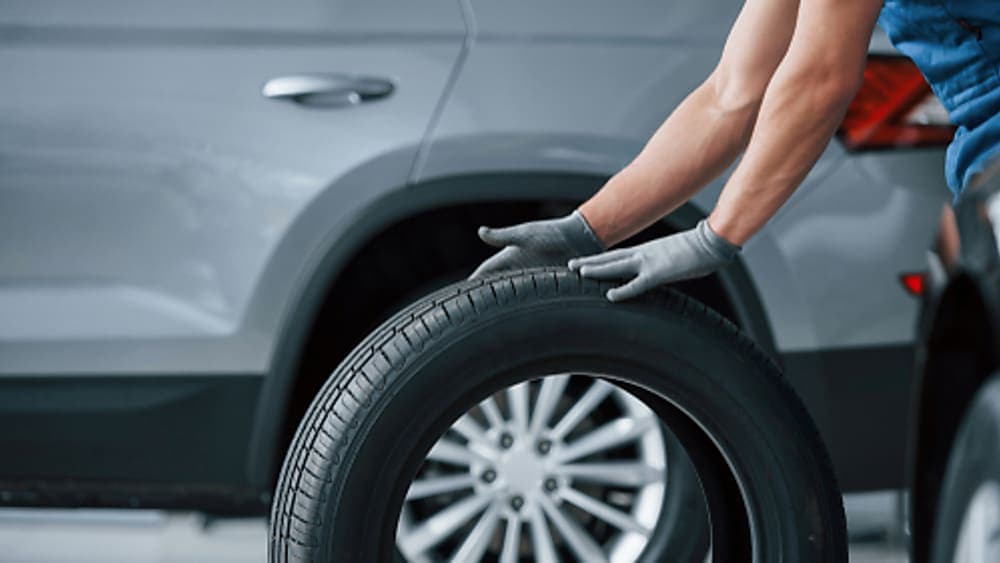Tire maintenance & safety
3 SimpleTips for better gas mileage

Free shipping
Best price guarantee
SimpleCrew exclusive savings
0% financing options
Tire replacement coverage
24/7 roadside assistance
Easy returns
Tire maintenance & safety


Tires are an essential component of your vehicle, playing a crucial role in ensuring a safe and comfortable ride. However, they often go overlooked until a problem arises, leaving many drivers stranded on the side of the road with a flat tire or worse.
Proper tire maintenance is not only vital for your safety but also for your wallet. By taking care of your tires, you can significantly extend their lifespan and save money on costly replacements and repairs.
In this article, we'll explore seven essential tire care tips that will help you save money and keep your tires in top condition. From regular pressure checks to mindful driving habits, these practical tips will ensure you get the most out of your tires while maintaining optimal vehicle performance and safety.
Tire maintenance is crucial for extending the life of your tires and saving money in the long run. Neglecting your tires can lead to premature wear, decreased performance, and even dangerous driving conditions. By investing a little time and effort into regular tire care, you can prevent costly replacements and ensure a safer, more comfortable ride.
Properly maintained tires not only last longer but also enhance your vehicle's overall performance. When tires are inflated to the correct pressure and have adequate tread depth, they provide better traction, handling, and fuel efficiency. This means a smoother ride, improved safety, and even savings at the gas pump.
Moreover, regular tire maintenance can help you avoid unexpected breakdowns and accidents caused by tire failure. A well-maintained set of tires is less likely to experience blowouts or lose traction on wet or slippery roads. By prioritizing tire care, you're not only protecting your investment but also the safety of yourself and your passengers.
One of the most important aspects of tire maintenance is ensuring that your tires are inflated to the manufacturer's recommended levels. Underinflated tires can lead to decreased fuel efficiency, premature wear, and even dangerous blowouts. On the other hand, overinflated tires can cause a harsh ride and uneven tread wear.
To maintain proper tire pressure:
By keeping your tires properly inflated, you can improve your vehicle's fuel economy, extend the life of your tires, and ensure a safer driving experience.
Tire rotation involves moving your tires from one position to another on your vehicle to promote even tread wear. This is important because the weight distribution on your vehicle is not equal, with the front tires typically bearing more weight and experiencing more wear than the rear tires.
To get the most out of your tires, consider the following:
Regular tire rotations help extend the life of your tires, improve vehicle handling, and ensure a smoother ride. By distributing the wear evenly across all four tires, you can avoid premature replacements and save money in the long run.
Tread depth is a critical factor in your tires' ability to provide traction, especially in wet or slippery conditions. As your tires wear down, their ability to grip the road decreases, which can lead to longer stopping distances and reduced handling capabilities.
To check your tread depth:
Maintaining proper tread depth is essential for safe driving, as it helps prevent accidents caused by poor traction. By regularly inspecting your tires and replacing them when necessary, you can ensure optimal performance and avoid costly accidents.
Wheel alignment and balancing are two important aspects of tire maintenance that are often overlooked. Misaligned wheels can cause your tires to wear unevenly, leading to premature replacement and decreased fuel efficiency. Unbalanced tires, on the other hand, can cause vibrations and a bumpy ride, which can lead to driver fatigue and decreased vehicle control.
To keep your wheels aligned and balanced:
By maintaining proper wheel alignment and balance, you can extend the life of your tires, improve fuel efficiency, and ensure a smoother, safer ride.
Overloading your vehicle can put excessive strain on your tires, leading to premature wear and even tire failure. Each tire has a specific load capacity, which is the maximum weight it can safely support. Exceeding this limit can cause the tire to overheat, leading to blowouts and other dangerous situations.
To avoid overloading your tires:
By adhering to your tires' load limits, you can prevent unnecessary damage and ensure a safer driving experience.
In addition to monitoring tread depth and maintaining proper inflation, it's essential to regularly inspect your tires for signs of damage. Road hazards like potholes, debris, and curbs can cause cuts, punctures, or bulges in your tires, which can lead to air leaks and even blowouts.
To inspect your tires for damage:
Early detection of tire damage can help prevent more serious issues down the road, ultimately saving you money on costly repairs or replacements.
Your driving habits can have a significant impact on the lifespan of your tires. Aggressive driving behaviors like rapid acceleration, hard braking, and taking corners too quickly can cause your tires to wear out faster and even lead to premature damage.
To extend the life of your tires through mindful driving:
By adopting a more mindful approach to driving, you can not only extend the life of your tires but also improve your fuel efficiency and overall safety on the road.
In conclusion, proper tire maintenance is essential for ensuring the longevity of your tires, the safety of your vehicle, and the cost-effectiveness of your driving experience. By following these seven essential tire care tips—regularly checking tire pressure, rotating tires, inspecting tread depth and damage, aligning and balancing wheels, avoiding overloading, and driving mindfully—you can save money, extend the life of your tires, and enjoy a safer, more comfortable ride. Remember, investing a little time and effort into tire maintenance can go a long way in protecting your investment and ensuring a worry-free driving experience.
Search By